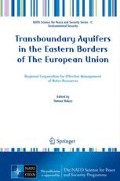Abstract
The analysis of the history of water conflicts which have inseparably accompanied the development of our civilisation indicates many interesting trends. Most countries have transboundary waters in their territory, which gave rise to various conflicts at a smaller or greater scale in the past. Observations and analyses of examples from Middle East, Africa or Southeast and Central Asia should lead to conclusions and activities to prevent water conflicts which may occur practically everywhere in the world. This is particularly important at the time of a dramatic population growth, the extreme natural phenomena and climatic variability. Different scenarios indicate that water resources will be one of the most desired raw materials in the twenty-first century, which can give rise to intensifying conflicts in the areas of transboundary waters.
At the time of shrinking unpolluted surface water resources, groundwater can also be the cause of conflicts. Therefore, the prevention of water conflicts should be a strategic and priority direction of actions by states which share transboundary waters, while the lessons learned from the water conflicts known to date should contribute to the building of a compromise and rational water management between the neighbouring countries.
Access this chapter
Tax calculation will be finalised at checkout
Purchases are for personal use only
References
Gleick P (2004) Environment and water conflict chronology. Compiled by Pacific Institute, The World of Water. www.worldwater.org/conflictIntro.htm
Baturo W (2008) Wielkie tematy – Katastrofy i zagrożenia we współczesnym świecie (Great subjects – disasters and threats in the contemporary world – in Polish). PWN, Warsaw
Kowalczak P (2007) Konflikty o wodę (Water conflicts – in Polish). Kurpisz S.A, Przeźmierowo
Wolf A, Yoffe S, Giordano M (2003) International waters: identifying basins at risk. University of Oregon, Corvallis
Kapuściński R (1999) Planeta Ziemia (Planet Earth – in Polish). Gazeta Wyborcza, 26–27 June 1999
Salman SMA, Uprety K (2002) Conflict and cooperation on South Asia’s International Rivers. Kluwer Law International, London
Brichieri-Colombi S, Bradnock RW (2003) Geopolitics, water and development in South Asia: cooperative development in the Ganges-Brahmaputra delta. Geogr J 169(1):43–64
Kibaroglu A, Scheumann W (2011) Euphrates-Tiger River: system: political rapprochement and transboundary water cooperation. In: Turkey’s water policy: national framework ad international cooperation. Springer, Berlin
Kibaroglu A (2008) The role of epistemic communities in offering new cooperation frameworks in the Euphrates-Tigris rivers system. J Int Affairs 61(2):191–195
Kibaroglu A et al. (2005) Cooperation on Turkey’s transboundary waters. Status report, German Federal Ministry for Environment, Nature Conservation and Nuclear Safety, Berlin, p 8
Wolf A, Ross J (1992) Impact of source water resources on the Arab-Israeli conflict. Nat Resou J 32(4):919–958
Derwish A (2003) Midle East water wars, BBC May 30, www.globalpolicy.org/security/naters/water/2003/0530derwish.htm
Diab ZM (1995) Syrian security requirements in a peace settlement with Israel. Israel Affairs 1(4)
Farinelli XH (1997) Freshwater conflicts in the Jordan River Basin. Green Cross International, Geneva
Directive 2000/60/EC of the European Parliament and of the Council of 23 October 2000 establishing a framework for community action in the field of water policy (WFD)
Nałęcz T (ed) (2011) Groundwater management in the east of the European Union. NATO SPS/Springer, Dordrecht
Brawn L (2003) Scarcity crossing national boundaries, emerging water shortages. In: Plan B: Rescuing a planet under stress and a civilization in trouble. W.W. Norton & Co., New York
Kazimierski B, Rudzińska-Zapaśnik T, Gidziński T (2005) The influence of Jänschwalde Lignite Mine dewatering on the groundwater regime in the Gubin Area. Current challenges in hydrogeology, Toruń, vol XII:331–336
IPCC (2007) Contribution of working groups I, II and III to the fourth assessment report of the Intergovernmental Panel on Climate Change. IPCC, Geneva, p 104
Keegen J (1998) Historia wojen (A history of warfare). Książka i Wiedza, Warsaw
Author information
Authors and Affiliations
Corresponding author
Editor information
Editors and Affiliations
Rights and permissions
Copyright information
© 2012 Springer Science+Business Media Dordrecht
About this paper
Cite this paper
Nałęcz, T. (2012). Lessons Learned from the Water Conflicts Are a Warning for the Water Policy Makers in the 21st Century. In: Nałęcz, T. (eds) Transboundary Aquifers in the Eastern Borders of The European Union. NATO Science for Peace and Security Series C: Environmental Security. Springer, Dordrecht. https://doi.org/10.1007/978-94-007-3949-9_3
Download citation
DOI: https://doi.org/10.1007/978-94-007-3949-9_3
Published:
Publisher Name: Springer, Dordrecht
Print ISBN: 978-94-007-3948-2
Online ISBN: 978-94-007-3949-9
eBook Packages: Earth and Environmental ScienceEarth and Environmental Science (R0)

